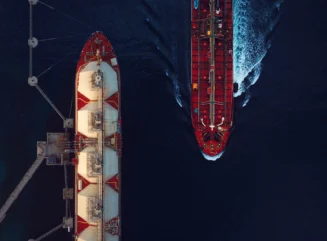Transparent and independent market benchmarks and indices that provide investors, asset managers, and regulators with a trusted standard for developing new instruments, measuring performance, and capitalising on opaque markets.
As extreme weather events proliferate, energy firms, commodity traders and other financial institutions are diversifying their ways to hedge against poor weather outcomes, creating a boom in weather derivatives.
In an article for the Wall Street Journal, CME Group (which operates the Chicago Mercantile Exchange, Chicago Board of Trade, New York Mercantile Exchange, and The Commodity Exchange) said that the conglomerate was expanding its weather derivatives franchise to include new territories to meet growing demand from rising numbers of market participants. [1]
In 2023, CME Group saw average trading volumes for its weather derivatives suite surge over 260% compared to 2022, while the number of outstanding contracts was up 48% year-on-year as of May. [2]
However, a report in Bloomberg pointed out that publicly traded derivatives might represent as little as 10% of all weather derivative activity. [3] Some industry estimates put the total market at as much as $25 billion, it added.
CME group has recently added contracts tied to weather in Paris, Essen, Burbank, Houston, Philadelphia and Boston to a US and international portfolio that already includes cities like New York, Chicago, London, Amsterdam and Tokyo. [4]
A short history of weather derivatives
According to an explainer from TP ICAP Group, weather derivatives help businesses hedge against the financial impact of weather variability. [5] Rather than linking to commodities or stocks, the derivatives track weather indices, such as temperature, precipitation, or wind speed and create contracts based on these conditions over a given timeframe.
“For example, an energy company might purchase a weather derivative to protect against the financial losses associated with an unusually warm winter, which would reduce the demand for heating. If the actual weather conditions match those specified in the contract, the buyer receives a payout that offsets the financial impact of the adverse weather,” TP ICAP explains.
Weather derivatives started trading over the counter in the late 1990s and evolved from there into an asset class on the Chicago Mercantile Exchange (CME). While most popular in the US, there are signs that the idea is starting to spread to developing countries. Earlier this year, for example, the National Commodity and Derivatives Exchange (NCDEX) of India reportedly started working on the construction of a suite of weather indices for trading of weather futures, after the Indian central government added weather to its approved derivatives list. [6]
Weather derivatives can be futures, options, or swaps. In a swap, two parties might agree to exchange cash flows based on actual versus expected weather outcomes. These instruments are becoming crucial for sectors like agriculture, energy, and insurance, providing a vital tool for managing weather-related financial risks.
Future market growth
The market is still starting out compared with other commodity futures. Average open interest in CME weather futures and options contracts in September this year was around 170,000 contracts, compared to roughly 10 times that for crude oil, according to Reuters. [7] However, that doesn’t account for the roughly 90% of the weather derivatives market that takes place in over-the-counter deals.
For now, the primary use of these derivatives is to hedge against changing weather. As the weather warms, energy firms might hedge against falling demand for heating for example. The agricultural sector is another obvious customer. But changing weather can affect almost any commercial endeavour. Alongside heightened risks for insurers of wildfires and floods, there are more prosaic applications such as ski resorts with falling patronage because they don’t get enough snow or festival organisers that get rained out in the summer.
Although they don’t yet lend themselves to speculation because they’re not typically traded like commodities futures, market participants say hedge funds and other institutions are getting more involved. [8]
“[They] see themselves as a risk warehouse like an insurance or reinsurance company, ” Martin Malinow, founder and CEO of Parameter Climate, told Reuters. “It is a sign of a more functional market, having players like Citadel in it that can play different roles.” [9]
According to TP ICAP, weather derivatives “stand at the forefront of financial innovation, transforming how an ever-greater range of businesses manage their exposure to the risks posed by volatile weather patterns”. [10]
Related Solutions
Turn to Parameta for comprehensive benchmarks & indices and environmental data to help you navigate complexity, manage risk, and seize new opportunities.
Related Solutions
Turn to Parameta for comprehensive benchmarks & indices and environmental data to help you navigate complexity, manage risk, and seize new opportunities.
Benchmarks & Indices
Environmental
Environmental pricing data, including emissions for EMEA and North America, as well as North American Biofuels.
Bibliography
Bibliography
[1] https://partners.wsj.com/cme-group/beyond-the-market/weather-derivatives-grow-as-risks-intensify/#:~:text=Last%20year%2C%20for%20instance%2C%20CME,on%2Dyear%20as%20of%20May
Read Source[2] https://partners.wsj.com/cme-group/beyond-the-market/weather-derivatives-grow-as-risks-intensify/#:~:text=Last%20year%2C%20for%20instance%2C%20CME,on%2Dyear%20as%20of%20May
Read Source[3] https://www.bloomberg.com/news/articles/2024-12-17/weather-derivatives-what-are-they-and-why-is-demand-soaring
Read Source[4] https://partners.wsj.com/cme-group/beyond-the-market/weather-derivatives-grow-as-risks-intensify/#:~:text=Last%20year%2C%20for%20instance%2C%20CME,on%2Dyear%20as%20of%20May
Read Source[5] https://tpicap.com/tpicap/weather
Read Source[6] https://www.artemis.bm/news/india-exchange-developing-weather-futures-index-after-weather-derivative-approval/
Read Source[7] https://www.reuters.com/markets/global-markets-weather-derivatives-analysis-pix-2023-10-11/
Read Source[8] https://www.reuters.com/markets/global-markets-weather-derivatives-analysis-pix-2023-10-11/
Read Source[9] https://www.reuters.com/markets/global-markets-weather-derivatives-analysis-pix-2023-10-11/
Read Source[10] https://tpicap.com/tpicap/weather
Read SourceDisclaimer
© 2025 ICAP Information Services Limited (“IISL”). This communication is provided by ICAP Information Services Limited or a member of its group (“Parameta”) and all information contained in or attached hereto (the “Information”) is for information purposes only and is confidential. Access to the Information by anyone other than the intended recipient is unauthorised without Parameta’s prior written approval. The Information may not be not used or disclosed for any purpose without Parameta’s prior written approval, including without limitation, storing, copying, distributing, licensing, selling or displaying the Information, using the Information in an application or to create derived data of any kind, co-mingling the Information with any other data or using the data for any unlawful purpose of for any purpose that would cause it to become a benchmark under any law, regulation or guidance. The Information is not, and should not be construed as, a live price, an offer, bid, recommendation or solicitation in relation to any financial instrument or investment or to participate in any particular trading strategy or constituting financial or investment advice or a financial promotion. The Information does not constitute a public offer under any applicable legislation or an offer to sell or a solicitation of an offer to buy any securities. The Information is not to be relied upon for any purpose whatsoever and is provided “as is” without warranty of any kind, either expressly or by implication, including without limitation as to completeness, timeliness, accuracy, continuity, merchantability or fitness for any particular purpose. All representations and warranties are expressly disclaimed, to the fullest extent possible under applicable law. In no circumstances will Parameta be liable for any indirect or direct loss, or consequential loss or damages including without limitation, loss of business or profits arising from the use of, any inability to use, or any inaccuracy in the Information. Parameta may suspend, withdraw or modify or change the terms of the provision of the Information at any time in its sole discretion, without notice. All rights, including without limitation intellectual property rights, in and to the Information are, and shall remain, the property of IISL or its licensors. Use of, access to or delivery of Parameta’s products and/or services requires a prior written licence from Parameta or its relevant affiliates. The terms of this disclaimer are governed by the laws of England and Wales.



